
DOWN BEAT
Scope & Guideline
Diving Deep into the Melodies of History and Criticism
Introduction
Aims and Scopes
- Jazz History and Analysis:
The journal features in-depth articles that explore the historical evolution of jazz, its key figures, and influential movements, providing critical insights into the genre's development. - Artist Profiles and Interviews:
DOWN BEAT regularly publishes profiles and interviews with contemporary and historical jazz musicians, offering readers a closer look at their artistic processes and contributions to the genre. - Jazz Education and Pedagogy:
The journal addresses educational topics related to jazz, including teaching methods, curriculum development, and the role of jazz education in fostering musical talent among younger generations. - Cultural Context and Social Issues:
Articles often discuss the intersection of jazz with cultural and social issues, examining how the genre reflects and influences societal changes, particularly in relation to race and identity. - Music Reviews and Critiques:
DOWN BEAT provides critical reviews of new jazz albums, performances, and festivals, helping audiences navigate the vast array of contemporary jazz offerings.
Trending and Emerging
- Diversity and Inclusion in Jazz:
There is a growing emphasis on representation and the contributions of underrepresented groups in jazz, including women and artists of color, reflecting broader societal movements for equity. - Fusion Genres and Cross-Genre Collaborations:
The journal highlights the increasing popularity of fusion genres that blend jazz with hip-hop, electronic music, and world music, showcasing innovative collaborations that push the boundaries of traditional jazz. - Mental Health and Wellbeing in Music:
Emerging discussions focus on the mental health challenges faced by musicians, with a growing recognition of the importance of mental wellness in the creative process. - Environmental and Social Justice Themes:
Articles are increasingly addressing how jazz intersects with environmental issues and social justice, exploring how artists use their platform to advocate for change. - Technological Advancements in Music Creation:
There is a rising interest in how technology influences jazz creation and performance, including the use of digital tools for composition and collaboration in remote settings.
Declining or Waning
- Traditional Jazz Styles:
There seems to be a waning interest in traditional jazz styles, such as Dixieland and swing, as contemporary forms and fusion genres gain traction among both artists and audiences. - Jazz Record Labels and Industry Analysis:
Discussions that critically analyze the role of record labels in promoting jazz have decreased, possibly due to the rise of independent releases and digital distribution channels. - Jazz Festivals and Events Coverage:
Coverage of specific jazz festivals and events has become less frequent, possibly reflecting the impact of the COVID-19 pandemic on live performances and gatherings. - Historical Jazz Recordings:
There appears to be a diminishing focus on reissues and retrospectives of historical jazz recordings, with less emphasis on archival content as contemporary releases take precedence. - Jazz Instrument Technology:
There is a noticeable decline in articles discussing innovations in jazz instrument technology, which were previously a staple in discussions about the evolution of jazz performance.
Similar Journals
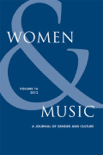
Women and Music-A Journal of Gender and Culture
Fostering Inclusive Scholarship in Gender and the ArtsWomen and Music: A Journal of Gender and Culture is a pioneering academic journal published by University of Nebraska Press, focusing on the intersection of gender and music. With a commitment to exploring issues pertinent to women and music in a range of cultural contexts, this journal provides a critical platform for scholars, musicians, and educators to share research that enriches our understanding of gender dynamics within the music industry and music's role in society. While currently not an open-access journal, it aims to make significant contributions to gender studies, cultural studies, and musicology, attracting a dedicated readership from various backgrounds. The journal is essential for those interested in feminist musicology and gender representation in the arts, fostering discourse that challenges traditional narratives and promotes inclusive scholarship. By bringing together diverse perspectives and innovative research, Women and Music continues to push boundaries and foster important conversations within both academic and artistic communities.
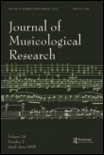
JOURNAL OF MUSICOLOGICAL RESEARCH
Exploring the Depths of Musical ScholarshipJOURNAL OF MUSICOLOGICAL RESEARCH, published by Taylor & Francis Ltd, is an esteemed platform that delves into the field of musicology, contributing to the ongoing dialogue in music research and scholarship since its establishment in 1979. With an ISSN of 0141-1896 and an E-ISSN of 1547-7304, this journal serves as a vital resource for researchers, professionals, and students, offering insights into diverse musicological topics. Although currently categorized in Q4 in Music with Scopus rankings placing it at #110 out of 180 in the Arts and Humanities field, its commitment to excellence and broader discourses in music studies is evident. The journal does not have Open Access options, yet it provides accessible content through reputable academic channels, fostering scholarly exchanges within the community. It aims to publish high-quality research that advances understanding of musical practices and cultural implications, making it a critical resource for those passionate about music and its myriad influences.

Problemy Muzykalnoi Nauki-Music Scholarship
Advancing Knowledge in Music Theory and CultureWelcome to Problemy Muzykalnoi Nauki-Music Scholarship, a leading journal in the field of music scholarship published by the esteemed Gnesin Russian Academy of Music. With an ISSN of 2782-358X and an E-ISSN of 2782-3598, this Open Access journal has been committed to the dissemination of high-quality research since 2009, making scholarly work accessible to a global audience. Covering diverse aspects of music theory, history, and its socio-cultural impacts, Problemy Muzykalnoi Nauki serves as an essential platform for scholars, educators, and practitioners in the arts and humanities, as well as in social sciences related to music education. While its Scopus coverage was discontinued in 2021, the journal remains influential, holding a rank of #48 in the Arts and Humanities category and a percentile of 67th, showcasing its relevance and rigor in the discipline. We invite researchers and students alike to explore the rich contributions made within these pages, fostering a deeper understanding and appreciation of music in contemporary society.

Zeitschrift der Gesellschaft fur Musiktheorie
Bridging the gap between research and musical understanding.Zeitschrift der Gesellschaft für Musiktheorie (ISSN: 1862-6750, E-ISSN: 1862-6742) is a premier open-access journal published by the Gesellschaft Musiktheorie, devoted to advancing the field of music theory. Since its inception in 2003, it has provided a crucial platform for the dissemination of innovative research, theoretical discourse, and critical discussions pertinent to music analysis, pedagogy, and aesthetics. Based in Berlin, Germany, this journal not only showcases the latest in musicological scholarship but also fosters a vibrant community of researchers, practitioners, and educators. With a commitment to accessibility, all published articles are freely available, enhancing the reach and impact of the work within the global music community. This journal is essential reading for anyone seeking to deepen their understanding of musical structures and practices, making it an invaluable resource for students, academics, and music professionals alike.

Muzikoloski Zbornik
Championing Open Access in Music ScholarshipMuzikoloski Zbornik is a prominent open-access journal in the field of musicology, published by the esteemed University of Ljubljana Press since 1965. Hailing from Slovenia, this journal has been dedicated to advancing the study of musical heritage, theory, and practice, serving as a vital platform for researchers, professionals, and students alike. With a notable Q2 category ranking in the field of music and a Scopus ranking of 109 out of 180 in Arts and Humanities, Muzikoloski Zbornik showcases high-quality research, fostering discourse and collaboration among scholars globally. The journal embraces a diverse range of topics, from ethnomusicology to music education, ensuring its relevance in an ever-evolving academic landscape. By providing unrestricted access to its content, it champions the dissemination of knowledge and supports the growth of the musicology discipline.
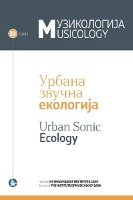
Muzikologija-Musicology
Transforming Music Research into Global DialogueMuzikologija-Musicology, published by the esteemed Serbian Academy of Sciences and Arts, Institute of Musicology (SASA), serves as a pivotal platform for scholarly discourse in the field of musicology. With its ISSN 1450-9814 and E-ISSN 2406-0976, this open-access journal has been committed to disseminating high-quality research since 2002, making significant contributions to the understanding and analysis of music in diverse cultural contexts. Located in Belgrade, Serbia, the journal proudly holds a Q2 ranking in the Music category for 2023, reflecting its high-impact contributions as evidenced by its Scopus rank of #136/180 and a percentile of 24th. Covering a wide array of topics within music, from ethnomusicology to music theory and history, it invites contributions that push the boundaries of music research. By fostering an open-access model, Muzikologija-Musicology aims to ensure that its findings are accessible to a global audience, thereby enriching the discourse and fostering collaboration in the musicology community.

REVUE DE MUSICOLOGIE
Unveiling the Cultural Tapestry of SoundREVUE DE MUSICOLOGIE is a prominent academic journal dedicated to the diverse field of musicology, published by EDITIONS TRANSATLANTIQUES in France. With an ISSN of 0035-1601, this journal has been a key platform for researchers and scholars since its inception, fostering scholarly discourse and advancing the understanding of music's cultural, theoretical, and historical dimensions. Although it currently holds a Q4 category in Music according to the 2023 quartiles and is ranked #140 in the Scopus Arts and Humanities Music category, REVUE DE MUSICOLOGIE continues to publish valuable insights that contribute to the global musicological landscape. The journal does not offer open access, adhering to standard subscription models. Its primary objective is to provide a rigorous forum for original research articles, reviews, and theoretical discussions, making it an essential resource for academics, professionals, and students in the field of musicology. Located at 50 RUE JOSEPH DE MAISTRE, 75018 PARIS, FRANCE, it promises to remain a vital part of music research through 2023 and beyond.

FOLK MUSIC JOURNAL
Preserving the Past, Inspiring the FutureFolk Music Journal, published by the English Folk Dance Song Society, is a prominent publication within the fields of Music and Visual Arts and Performing Arts. This journal, based in the United Kingdom at Cecil Sharp House, has been instrumental in advancing the study and appreciation of folk music, sharing invaluable research and insights from 2002 until its recent coverage concluded in 2020. Notably indexed with a Q3 rank in both the Music and Visual Arts categories for 2023, it stands as a significant resource for researchers, professionals, and students alike, contributing to a deeper understanding of folk music's cultural impact. Although it does not currently offer Open Access, the journal has fostered scholarly discourse, reflecting its vital role in the preservation and analysis of traditional musical forms.
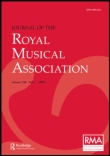
JOURNAL OF THE ROYAL MUSICAL ASSOCIATION
Exploring the depths of musical innovation.JOURNAL OF THE ROYAL MUSICAL ASSOCIATION, published by Cambridge University Press, stands as a significant repository for innovative research and scholarly discourse within the field of music studies. Recognized for its contributions to the understanding of musical practices, theory, and history, this esteemed journal offers a platform for academics and researchers to disseminate their findings to a broad audience. With an ISSN of 0269-0403 and E-ISSN of 1471-6933, the journal has maintained a notable presence since its inception, merging insights from both traditional and contemporary musicology. It currently occupies a Q4 ranking in Music within the Scopus database, reflecting its inclusion within the arts and humanities landscape. While the journal traditionally operates under subscription access, its continuing commitment to advancing music scholarship ensures that it remains an essential resource for students, scholars, and practitioners alike, fostering greater understanding and appreciation of musical artistry from 1987 to the current era.
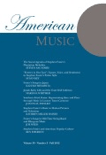
AMERICAN MUSIC
Advancing Scholarship in the Heart of American MusicAMERICAN MUSIC, published by the esteemed University of Illinois Press, is a prominent peer-reviewed journal that serves as a vital resource for researchers, professionals, and students dedicated to the study of Music in the Arts and Humanities. With an ISSN of 0734-4392 and an E-ISSN of 1945-2349, this quarterly journal has positioned itself in the Q3 category of music journals, indicating its significant contributions to the field. The journal has been actively disseminating research and scholarly articles from 2002 to 2023, and it maintains a valuable ranking within Scopus as #113 out of 180 in the subject area of Music. While the journal does not currently offer Open Access, its curated content is essential for advancing knowledge and scholarship within the discipline, exploring the intersections of music with culture, society, and history. Researchers and academics alike will find AMERICAN MUSIC a critical platform for engaging with contemporary musical trends and scholarly dialogues.